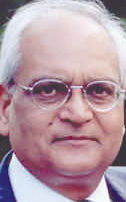Guest opinion: Aversion to the welfare state in the US

Vijay K. Mathur
We are witnessing in political thinking and actions at all levels of governments, and among the median voter, that there is an increasing aversion against social spending to assist the poor or those at the lower end of the income distribution. This is even though it is well known that income inequality has increased over a period of time.
It is especially more acute between whites and Blacks, as well as Latinos. Partly, this aversion is due to the fact that social welfare spending is increasing at a very rapid rate, even though most leave the rolls within five years, and partly because of abuse and deficiencies in managing the system.
The contrary view is presented by Mathew Desmond in his book, “Poverty by America.” He argues that the system is rigged since it favors those who are “advantaged.” Data show that poverty dropped from 22.4% in 1959 to 11.1 % in 1973. It sharply increased during the recession of 1980s. In 2023, it was 11.1%, much lower than 15.1% in 2010. But despite the less burdensome poverty rate at present, the aversion to public welfare in the U.S. is still quite pervasive.
Alberto Alesina, Edward Glaeser and Bruce Sacerdote, in their article for the Harvard Institute of Economic Research, examine the issue of difference between public welfare in Europe and the U.S. They argue that the usual economic models that advocate the redistribution of income policies guided by “variance, volatility of income, social cost of taxation and expected mobility of the median voter” cannot explain the difference.
The difference apparently is due to racial heterogeneity in the U.S., political institutions and racial animosity. Many voters are reluctant to have greater redistribution of income for the poor due to the perception that most recipients are Blacks. However, Pew Research Center (PRC) data from July 19, 2023, indicates, for example, that SNAP (food subsidy) data for 2020 showed that there were 62.7% whites and only 27% Blacks who were SNAP recipients.
The stereotype is that the poor and those on welfare are not motivated to work and get ahead. PRC reports (May 30, 2002) a poll of 2,000 Americans about their attitude on poverty, conducted by NPR, Kaiser Family Foundation and Harvard University. The respondents were almost evenly divided between the questions about which is the biggest cause of poverty: 1) not doing enough to get out of poverty, and 2) circumstances beyond their control. However, 50% of the more affluent believed in the first cause of poverty and 39% of the poor believed in the second.
The poll also found that two-thirds of Americans had the view that the poor have the same moral values as other Americans. Therefore, it does not make sense to argue that the poor are not motivated to work and get out of poverty and would rather find comfort to stay on the welfare roll, especially when the welfare payment is higher than earnings on the job. In such cases, the government will save taxpayers’ taxes if they spend resources in the short run on job skill training programs for welfare recipients.
Capitalism and free markets determine rewards for capital and labor. However, in the marketplace there are low-wage earners and high-wage earners. Professor Alan S. Blinder argues (The Wall Street Journal, June 7, 2024) that some lower-wage workers may require a social safety net and hence redistribution of income financed through progressive taxation, Social Security, unemployment compensation and other transfer payments. Aversion to redistribution among some politicians, prodded by a vocal group of Americans, has resulted in the allocation of resources for a thin safety net for the poor and lower income Americans.
Such a state of affairs in safety net programs in this wealthy country is at odds with other similarly wealthy countries of Western Europe. Sheryll Cashin states in Politico that even our tax code subsidizes the rich.
In 2001, the U.S. spent $1.8 billion in tax breaks, mostly for the rich. Each year, the U.S. loses $1 trillion in unpaid taxes due to the tax avoidance strategies of multinational corporations and wealthy families. Mathew Desmond reports that collecting unpaid taxes from the top 1% of households and closing loopholes of tax cheats would provide enough funds to reduce poverty.
It appears that most Americans who are averse to redistribution to help the poor and needy are not aware of the public resources flowing to the affluent. Perhaps people in responsible positions who make decisions about redistribution of resources have a vested interest in maintaining the status quo.
The recent budget bill (so called Big Beautiful Bill), passed by the Congress and signed by the president, is testimony to that mind set. Hopefully, future policies will remedy the adverse impact of this congressional act.
Vijay K. Mathur is former chairman and professor of economics and now professor emeritus, Department of Economics, Cleveland University, Cleveland, Ohio. He resides in Ogden.
